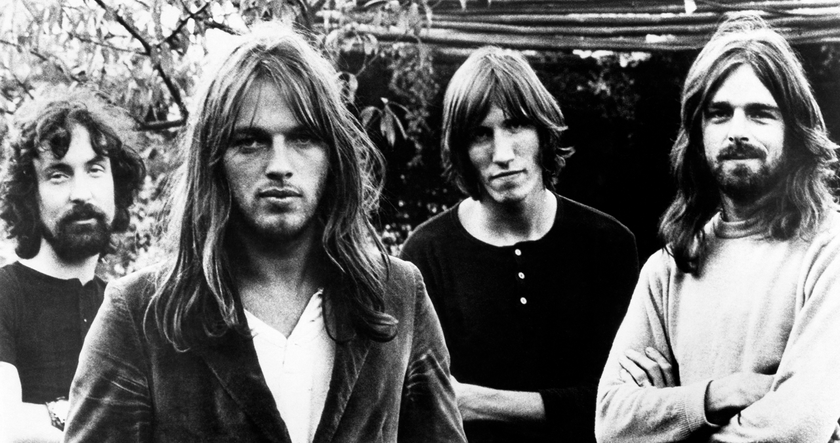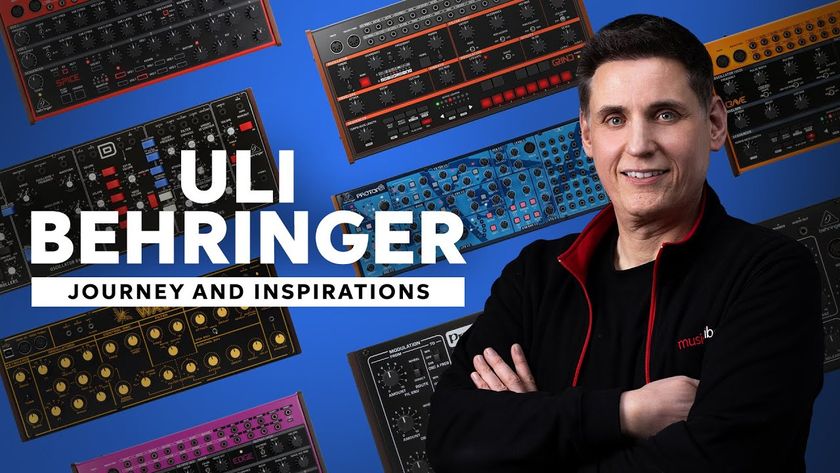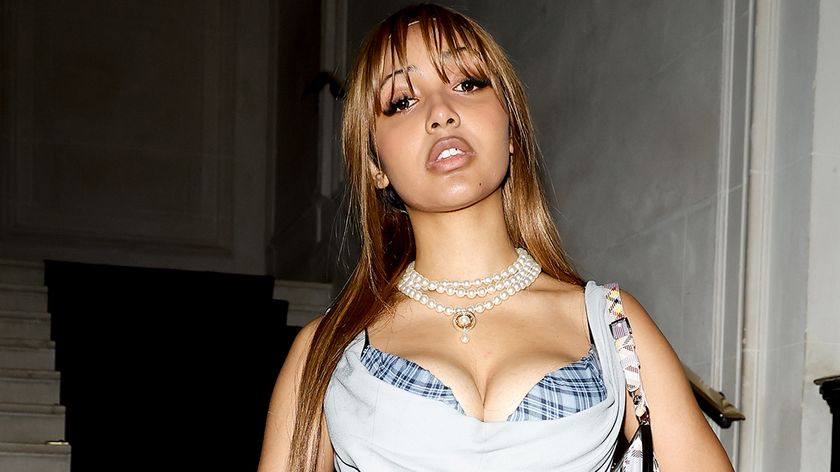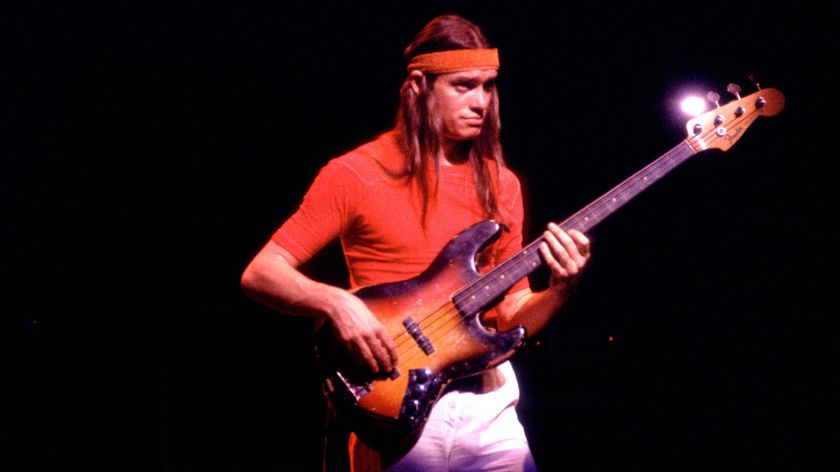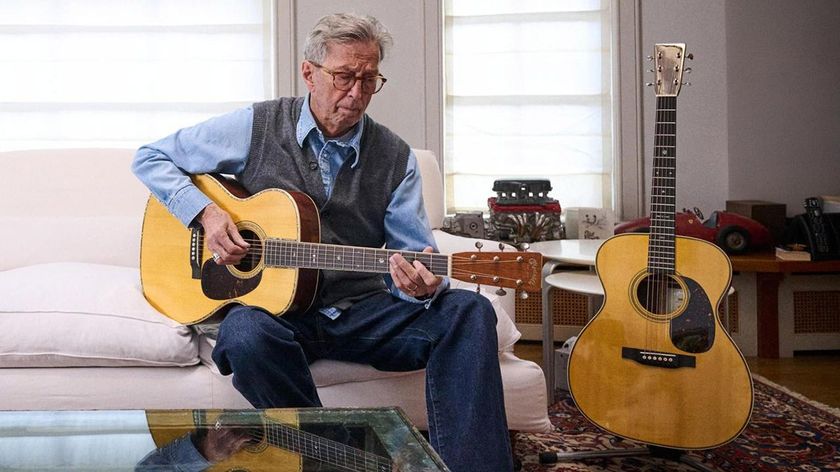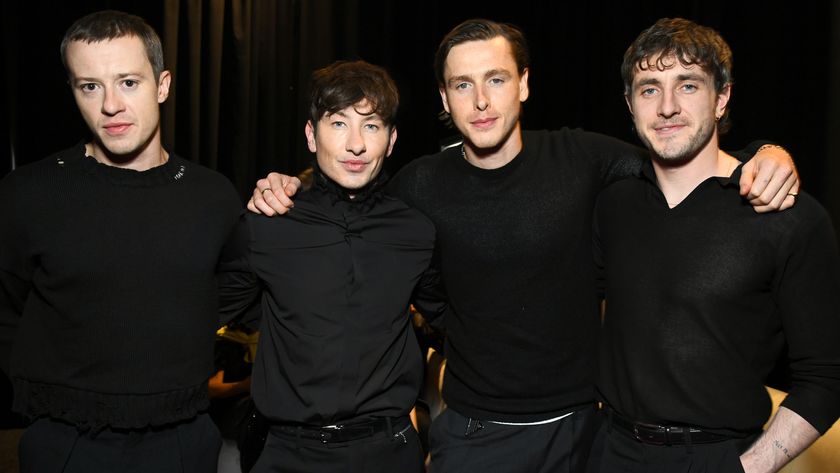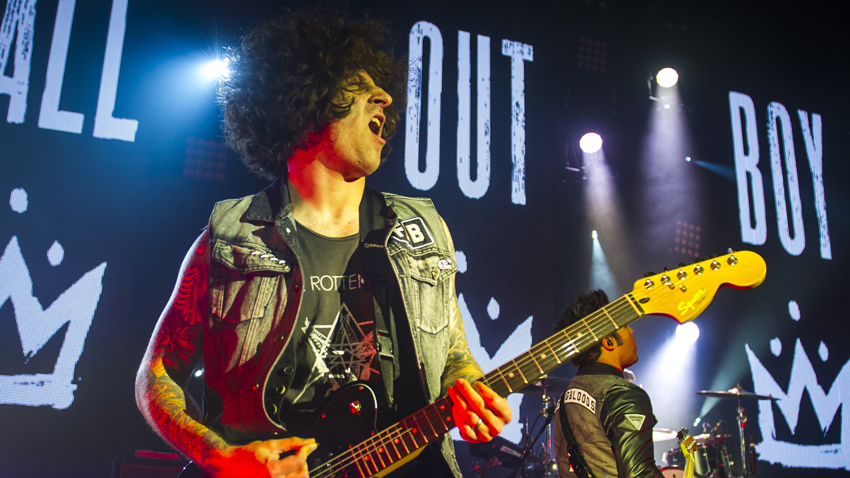
Fall Out Boy guitarist Joe Trohman is walking on air right now. But it's not just the band's splendid new album, Save Rock And Roll, and its number one debut on the chart that has him feelin' groovy. The gear-obsessed picker is elated over a recent acquisition for one of his amps.
"I just got an attenuator!" he enthuses. "These things aren't so easy to find. Dr. Z makes them, and so does THD. Problem is, they're so underused that you have to look around. I have an amp that doesn't have a master volume. It sounds awesome, but we just can't get an appropriate decibel level out of it. So getting this attenuator is a big triumph."
Hot-shit amp mods are one thing, but Fall Out Boy's current status as 2013's comeback kids is quite another. In truth, it didn't always look possible: In 2009, the band (which also features singer-guitarist Patrick Stump, bassist Pete Wentz and drummer Andy Hurley), feeling burned out and eager to put the tabloid press behind them (most of the cyber ink fed off of Wentz and his then-wife Ashlee Simpson), went on a well-publicized hiatus. The group members quickly immersed themselves in new projects, with Trohman and Hurley forming the metal supergroup The Damned Things (the band also includes Anthrax's Scott Ian and Rob Caggiano, along with Every Time I Die's Keith Buckley and Josh Newton). From all appearances, Fall Out Boy's semi-retirement was going to stick.
"It wasn't always certain that we'd get back together," Trohman notes. "But we all did a lot of growing up. As for me, I've had my own band, I got married, I have a dog, and so, yeah, now Fall Out Boy is back. I really don't have anything to properly complain about."
Troham sat down with MusicRadar recently to talk about how the band settled their differences and became a more democratic enterprise, the guitars he used in the studio, what it was like to work with savvy producer Butch Walker and how it feels to have Sir Elton John on a Fall Out Boy record.
During the years that the band was apart, what was your attitude towards a reunion? Were you hopeful? Ambivalent? Somewhere in-between?
"Ambivalence was a place I got to eventually. I just didn't want to do it. For three of the four years, I was just like, 'Nah, I don't think I'm gonna do this.' At first, I didn't want to do it with the expectation that we would just go back. After a while, I was enjoying how things were going with The Damned Things. I was fine in my life - I was happy. Even with The Damned Things, when everybody went back to their other bands, I thought, 'I'll do something else. I'll figure it out.'
Get the MusicRadar Newsletter
Want all the hottest music and gear news, reviews, deals, features and more, direct to your inbox? Sign up here.
"I never stopped talking to the guys in Fall Out Boy. Obviously, I talked to Andy because he was in The Damned Things. Patrick and I would often talk on the phone because he and I were the ones who wanted to do other things the most. But one day I was talking to Josh Newton - he and I had a band called With Knives, and he's actually my guitar tech now - and he said, 'You should probably do that band again' - meaning Fall Out Boy.
"A couple of days later, I was talking to Patrick, and I had already prepared a list of stipulations for me to do the band again, and before I could even say them, he already had my list in his head. He kind of disarmed me. After a very long phone call - I kept looking at the phone, which was edging on the three-hour mark - I was like, 'Yeah, I'm in. Let's do it.' And then I started writing heavily after I hung up."
So you had a list of stipulations. I take it there was a discussion that the band had to function differently than before.
"Yeah. That discussion happened in multiple tiers. My list of stipulations was semi-narcissistic. A big problem with Fall Out Boy and me came down to the fact that I had little opportunities to write for the band. It became frustrating. That's why I wrote for other bands. A lot of people liked the stuff I did, even though they might not have listened to it in a mega-Fall Out Boy scale.
"That was a big thing. If I was going to do Fall Out Boy, I wanted it to be a real outlet for my writing. That was something Patrick said to me even before I got to say it, which was wonderful. It was nice to hear a member of my band - and my whole band - say that they value what I do and wanted me to do it more."
Were you surprised?
"Surprised… But then I know Patrick very well, because he's a thoughtful dude. It was disarming in a great way. Patrick said, 'If would be a waste to not have you do what you do in this band.' The hiatus was good for us because we all got to go out and do other things, and our individual levels of self-confidence improved.
"That was one part of the conversation. Another part, which went into New York at our manager's apartment, was the idea of working with another producer. Apparently, I wasn't the only one who felt that way, which was great. Neil Avron did an awesome job with us, but that was a sound and an era, and I didn't think that it was a good idea to redo it. It's not dated in the way it exists, but it would be dated if we redid it.
"We wanted somebody who could help us develop a different band dynamic in the studio. Butch Walker is awesome with that, among other things he's awesome at. He really gave everybody a unique voice in the studio. He took control, and that's what you need: the captain steering the ship."
It sounds as though the communication levels in the band improved from what they once were.
"Things got more democratic. And it was about realizing that, if you were the odd man out in the band on something, maybe you need to think about why you're the odd man out. Communication issues were so piss-poor before. We're talking to each other more now. I mean, we're all guys - guys just stop communicating to begin with. So we're getting past all of that and trying very hard to talk to each other. It's way better than it used to be."
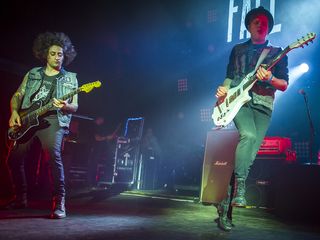
Trohman and Patrick Stump on stage at the Fillmore, Detroit, Michigan, May 2013. © Â Chris Schwegler/Retna Ltd./Corbis
So much of what you're saying reminds be of George Harrison, a massively talented songwriter fighting to be heard in The Beatles.
"I've gotten that before, and it's… humbling. In no way can I compare myself to George Harrison - or Fall Out Boy to The Beatles - but there's that similar dynamic, yeah. I mean, for George Harrison, he had to go away from The Beatles to ultimately prove himself."
How did you present songs to the band for this record? Did you make full-song demos? Did you show them little bits in the studio?
"I pretty much demoed things all the way through. I have a studio at home - I'm in New York City now - and I would get inspired by sounds, and I'd build things. I probably sent the guys 80 or 90 songs. Over the course of a year, we had over 200 songs in all and narrowed them down. It's not like they all came in at once. Pete's a really good sounding board. He can hear something and instantly say, 'That's a good idea. We should work on that.' We're also really close with our managers, and we bring them in and play them ideas. Ultimately, though, it comes down to us."
What guitars did you use for recording?
"I have a few that are my main guitars. I use my signature Squier a lot, which is awesome - I fucking love it. I also have a Gretsch Historic Series model. Then there's a Wayne Kramer Strat, which is really cool. I love making single-coil sounds that are kind of dark and menacing. I like guitar sounds to be a little somber."
You've had the signature Squier Telecaster for a few years. Any plans to update it?
"I came out with it a few years ago when I was doing The Damned Things. We've been doing some stuff with it lately. I had Billy Siegle at Fender make me a version with a Bigsby. He sent me a picture of Billy Duffy from The Cult holding it, and I flipped out when I saw that. That made my day! [Laughs] But I've been playing these baritones on stage, so we might do a version of my guitar with a baritone neck. We're still getting the main guitar out to people. I'm so pyched that I get to play it."
I can hear your influences on songs like The Mighty Fall - it's got a real rock vibe and a metallic riff - but it's interesting how the styles are all mixed up within the band.
"That one was more of a collaborative effort, yeah. People would be surprised at how much of an electronic dude I am, and I like new wave, post-punk and proto-punk stuff. There's a cool kind of ethereal, almost Johnny Marr lick in the bridge of the song Just One Yesterday - it repeats at the end of the song, too. There's a lot of places where I'm saying, 'How can I make this guitar not sound like a guitar?' I'm thinking of guys like The Edge, Martin Gore, Johnny Marr, Bernard Sumner - guys who have done that in the past.
"Fall Out Boy isn't overly rock in the rock sense. I have other bands where I can do guitar masturbation. One other thing I like to do is to have a ton of guitars on a track, but you might think there's no guitar at all. I like tweaking with things and playing tricks with sounds."

Troham plays one of his signature Fender/Squier John Trohman Telecasters, 2013. © Â Chris Schwegler/Retna Ltd./Corbis
I have to ask, how freaking cool is it to have Elton John on your album?
"Oh, dude, it's so cool! Here's how it happened: We were in France, and we got an e-mail. Apparently, Elton John, without knowing that we were making a record, said that he liked Fall Out Boy. He was putting together a record of other artists doing songs from Goodbye Yellow Brick Road, and he wanted us to do it. We were like, 'Holy fuck, that's really flattering! Uh… do you wanna do our record?' [Laughs]
"Patrick flew to Atlanta and was with him in the studio for, like, 20 minutes. That's how it went - it was fast. You know, Elton does what he does, he's really good at it, and that's all she wrote. Having that stamp of approval is incredible. It's amazing to have somebody with his lineage who's into what we're doing. He's been very supportive of us."
The band has a history of sometimes attracting the wrong kind of attention. Is there an attitude within the group now to be a little more low-key?
"I know what you mean. I think there's a move to maybe pipe down the shenanigans, so to speak. [Laughs] I understand that a lot of that came down on Pete - he's been the most 'celebrity-type' guy in the band. But he has a kid, and he's kind of taking it easy now. He's learned a lot from the things that have happened, and he wants as little attention on him as possible. He wants the attention to be on the band.
"We're not the hardest-partying band around - I'm probably the hardest partier of all of us. Even our crew is laid-back and cool. You know, I think people in general are stupid. Even the smartest among us are stupid; we're all morons. But when you get a little older, especially those who are a little more intelligent, you tend to stop doing as many stupid, childish things. That's where we're all at. We're getting older, and we don't want all the bullshit that we used to be into."
Joe is a freelance journalist who has, over the past few decades, interviewed hundreds of guitarists for Guitar World, Guitar Player, MusicRadar and Classic Rock. He is also a former editor of Guitar World, contributing writer for Guitar Aficionado and VP of A&R for Island Records. He’s an enthusiastic guitarist, but he’s nowhere near the likes of the people he interviews. Surprisingly, his skills are more suited to the drums. If you need a drummer for your Beatles tribute band, look him up.
![Chris Hayes [left] wears a purple checked shirt and plays his 1957 Stratocaster in the studio; Michael J. Fox tears it up onstage as Marty McFly in the 1985 blockbuster Back To The Future.](https://cdn.mos.cms.futurecdn.net/nWZUSbFAwA6EqQdruLmXXh-840-80.jpg)
“We’re looking at the movie going, ‘Urgh! It’s kinda cheesy. I don’t know if this is going to work”: How Chris Hayes wrote Huey Lewis and the News’ Back To The Future hit Power Of Love in his pyjamas
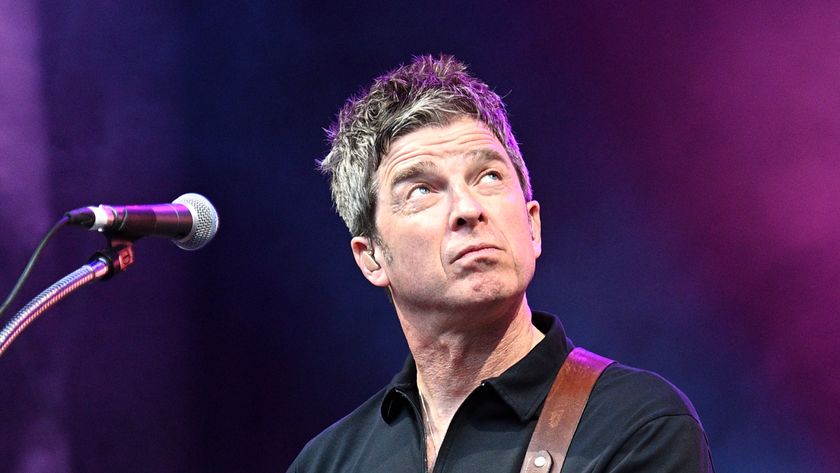
“I thought it’d be a big deal, but I was a bit taken aback by just how much of a big deal it was”: Noel Gallagher finally speaks about Oasis ticket chaos

